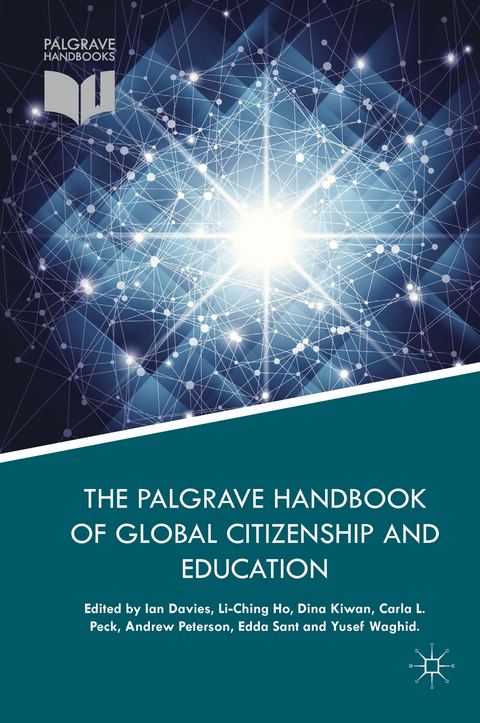
The Palgrave Handbook of Global Citizenship and Education
Palgrave Macmillan (Verlag)
978-1-137-59732-8 (ISBN)
The Handbook discusses, in the 'Key Ideologies' section, the philosophies that influence the meaning of global citizenship and education, including neo-liberalism and global capitalism; nationalism and internationalism; and issues of post-colonialism, indigeneity, and transnationalism. Next, the 'Key Concepts' section explores the ideas that underpin debates about global citizenship and education, with particular attention paid to issues of justice, equity, diversity, identity, and sustainable development. With these key concepts in place, the 'Principal Perspectives and Contexts' section turns to exploring global citizenship and education from a wide variety of viewpoints, including economic, political, cultural, moral, environmental, spiritual and religious, as well as taking into consideration issues of ethnicity, gender and sexuality, and social class. Finally, the 'Key Issues in the Teaching of Global Citizenship' section discusses how education can be provided through school subjects and study abroad programmes, as well as through other means including social media and online assessment, and political activism.
This Handbook will be vital reading for academics, postgraduates and advanced undergraduates in the fields of sociology and education, particularly those with an interest in comparative studies.
Ian Davies is Professor of Education at the University of York, UK. Li-Ching Ho is Assistant Professor of Social Studies at the University of Wisconsin-Madison, USA. Dina Kiwan is Associate Professor in the Department of Sociology, Anthropology and Media Studies, at the American University of Beirut, Lebanon. Carla L. Peck is Associate Professor of Social Studies Education in the Department of Elementary Education at the University of Alberta, Canada. Andrew Peterson is Professor of Civic and Moral Education at Canterbury Christ Church University, UK. Edda Sant is Senior Lecturer in the Department of Childhood, Youth and Education Studies at Manchester Metropolitan University, UK. Yusef Waghid is Distinguished Professor of Philosophy of Education at Stellenbosch University, South Africa.
PART I. Geographically-Based Overviews.- Chapter 1. Global Citizenship Education in Australasia; Andrew Peterson, Andrea Milligan & Bronwyn E. Wood.- Chapter 2. Europe and Global Citizenship; Alistair Ross & Ian Davies.- Chapter 3. The Middle East; Dina Kiwan.- Chapter 4. North America; Carla L. Peck & Karen Pashby.- Chapter 5. Global Citizenship Education in Latin America; Edda Sant & Gustavo Gonzalez Valencia.- Chapter 6. Conceptions of Global Citizenship Education in East and Southeast Asia; Li Ching Ho.- Chapter 7. Global Citizenship Education: A Southern African Perspective; Yusef Waghid.- PART II. Key Ideologies.- Chapter 8. Global Citizenship Education and Globalism; Silke Schraber-Basch.- Chapter 9. Living Together with National Border Lines and Nationalisms; Kanako Ide.- Chapter 10. Internationalism in Global Citizenship and Education; Tracey Isaacs.- Chapter 11. Transnationalism in Education: Theoretical Discussions and the Implications for Teaching Global Citizenship Education; Hannah Soong.- Chapter 12. Why Cosmopolitanism Needs Rethinking; Mariana Papastephanou.- Chapter 13. Global Citizenship Education, Postcolonial Identities, and a Moral Imagination; Nuraan Davids.- Chapter 14. Indigeneity and Global Citizenship Education: A Critical Epistemological Reflection; Philip Higgs.- PART III. Key Concepts.- Chapter 15. Justice and Global Citizenship Education; Edda Sant, Sue Lewis, Sandra Delgado & E. Wayne Ross.- Chapter 16. Global Citizenship and Equity: Cracking the Code and Finding Decolonial Possibility; Lynette Shultz.- Chapter 17. Diversity, Global Citizenship and the Culturally Responsive School; Robert Hattam.- Chapter 18. Identity, Belonging and Diversity in Education for Global Citizenship: Multiplying, Intersecting, Transforming and Engaging Lived Realities Identity and Belonging; Karen Pashby.- Chapter 19. Sustainable Development and Global Citizenship Education: Challenging Imperatives; Annette Gough.- PART IV. Principal Perspectives and Contexts.- Chapter 20. Economy and Economics; Rheinhold Hedtke.- Chapter 21. Politics, Global Citizenship and Implications for Education; Lynne Parmenter.- Chapter 22. Culture; Theresa Alviar-Martin.- Chapter 23. Morality; Thomas Misco.- Chapter 24. Transformative Spirituality and Citizenship; Binaya Subedi & Jeong-eun Rhee.- Chapter 25. Race, National Exclusion and the Implications for Global Citizenship Education; Jennifer Bondy & Aaron Johnson.- Chapter 26. Gender, Sexuality and Global Citizenship Education: Addressing the Role of Higher Education in Tackling Sexual Harassment and Violence; Vanita Sundaram.- Chapter 27. Migration and Implications for Global Citizenship Education: Tensions and Perspectives; Laura Quaynor & Amy Murillo.- Chapter 28. Social Class; Paul Wakeling.- PART V. Key Issues in Teaching and Learning.- Chapter 29. History Education and Global Citizenship Education; Antoni Santisteban, Joan Pagès & Liliana Bravo.- Chapter 30. Geography; William Gaudelli & Sandra Schmidt.- Chapter 31. Languages; Melina Porto.- Chapter 32. Science; David Geelan.- Chapter 33. Drama; Norio Ikeno & Jun Watanabe.- Chapter 34. Social Media and Youth: Implications for Global Citizenship Education; Manisha Pathak-Shelat.- Chapter 35. Seeking Global Citizenship through International Experiential/Service Learning and Global Citizenship Education: Challenges of Power, Knowledge and Difference for Practitioners; Allyson Larkin.- Chapter 36. Study Abroad and Global Citizenship: Paradoxes and Possibilities; Graham Pike & Mackenzie Sillem.- Chapter 37. Activism as/in/for Global Citizenship: Putting Un-Learning to Work towards Educating the Future; Stephanie Curley, Jeong-eun Rhee, Binaya Subedi & Sharon Subreenduth.- Chapter 38. Global Citizenship Education: Assessing the Unassessable?; Alicia Prowse and Rachel Forsyth.
| Erscheinungsdatum | 19.08.2017 |
|---|---|
| Zusatzinfo | 10 Illustrations, black and white; XXIX, 658 p. 10 illus. |
| Verlagsort | Basingstoke |
| Sprache | englisch |
| Maße | 155 x 235 mm |
| Themenwelt | Naturwissenschaften ► Biologie ► Ökologie / Naturschutz |
| Sozialwissenschaften ► Pädagogik ► Allgemeines / Lexika | |
| Sozialwissenschaften ► Pädagogik ► Bildungstheorie | |
| Sozialwissenschaften ► Soziologie ► Empirische Sozialforschung | |
| Schlagworte | activism • Capitalism • Citizenship • comparative education • Diversity • Education • Global • neoliberal • Social Justice |
| ISBN-10 | 1-137-59732-1 / 1137597321 |
| ISBN-13 | 978-1-137-59732-8 / 9781137597328 |
| Zustand | Neuware |
| Haben Sie eine Frage zum Produkt? |
aus dem Bereich


